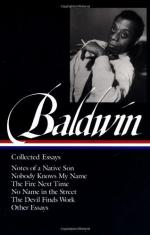|
This section contains 884 words (approx. 3 pages at 400 words per page) |

|
Summary
In this essay, Baldwin criticizes protest literature as sentimental, superficial, and stifling of true human freedom. When Baldwin refers to protest literature in this essay, he is talking about fiction or non-fiction works written as protests against racial inequality. He begins the essay with a biting critique of Harriet Beecher Stowe’s Uncle Tom’s Cabin, an anti-slavery novel published in 1852, nine years before the start of the American Civil War. He has three basic criticisms of Uncle Tom’s Cabin: that it is sentimental, that it simplifies instead of expanding our understanding of human beings, and that it is a book motivated by the fear of damnation rather than any deep understanding of the plight of slaves in America.
Baldwin calls Uncle Tom’s Cabin sentimental and says that sentimentality is “the mark of dishonesty, the inability to feel.” Stowe...
(read more from the Everybody’s Protest Novel Summary)
|
This section contains 884 words (approx. 3 pages at 400 words per page) |

|




